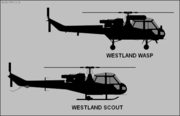
Navalised
Encyclopedia

Aircraft
An aircraft is a vehicle that is able to fly by gaining support from the air, or, in general, the atmosphere of a planet. An aircraft counters the force of gravity by using either static lift or by using the dynamic lift of an airfoil, or in a few cases the downward thrust from jet engines.Although...
that has been specifically designed for naval use, in some cases as a variant of a land-based design.
Characteristics
A navalised aircraft typically differs from its land-based equivalent by:- The airframe, engine and avionicsAvionicsAvionics are electronic systems used on aircraft, artificial satellites and spacecraft.Avionic systems include communications, navigation, the display and management of multiple systems and the hundreds of systems that are fitted to aircraft to meet individual roles...
are marinisedMarinisedMarinised is when products have been specifically designed, redesigned or tested for use and long term survival in the harsh marine environment...
against salt water corrosionCorrosionCorrosion is the disintegration of an engineered material into its constituent atoms due to chemical reactions with its surroundings. In the most common use of the word, this means electrochemical oxidation of metals in reaction with an oxidant such as oxygen...
.
- It is designed to be used on a flight deckFlight deckThe flight deck of an aircraft carrier is the surface from which its aircraft take off and land, essentially a miniature airfield at sea. On smaller naval ships which do not have aviation as a primary mission, the landing area for helicopters and other VTOL aircraft is also referred to as the...
. For a fixed wing aircraft this typically means catapultAircraft catapultAn aircraft catapult is a device used to launch aircraft from ships—in particular aircraft carriers—as a form of assisted take off. It consists of a track built into the flight deck, below which is a large piston or shuttle that is attached through the track to the nose gear of the aircraft, or in...
attachment points, a tailhookTailhookA tailhook, also arresting hook or arrester hook, is a device attached to the empennage of some military fixed wing aircraft...
and strengthened undercarriageUndercarriageThe undercarriage or landing gear in aviation, is the structure that supports an aircraft on the ground and allows it to taxi, takeoff and land...
. Naval helicopters usually have wheels rather than skids and may have mechanisms to attach to the deck.
- It is designed to occupy minimum hangar space – for example the wings, tail-boom or rotors may foldFolding wingA folding wing is a design feature of aircraft to save space in the airfield, and time, and is typical of naval aircraft that operate from the limited deck space of aircraft carriers. The folding allows the aircraft to occupy less space in a confined hangar because the folded wing normally rises...
.
- There is enhanced protection against ingestion of water (including that from hosing down with fresh water to get rid of salt water).
- Equipment such as sensors and weapons are optimised for naval roles.
- The avionics is compatible with the complex electronic equipment of a warship.
- There is provision for ditching at sea.
- Helicopters may have provision for receiving fuel through the cabin while hovering adjacent to a ship.
For safety reasons the aviation fuel provided by ships may be a different fuel (e.g. AVCAT) from the fuel provided by airfields and tanker aircraft.
Examples
The T-45 Goshawk is a navalised version of the BAE HawkBAE Hawk
The BAE Systems Hawk is a British single-engine, advanced jet trainer aircraft. It first flew in 1974 as the Hawker Siddeley Hawk. The Hawk is used by the Royal Air Force, and other air forces, as either a trainer or a low-cost combat aircraft...
jet trainer
Jet trainer
A Jet trainer is typically a turbofan or turbojet powered training aircraft, intended either for general aviation flying training or for more advanced jet aircraft. Jet trainers are typically divided into civilian and military, and custom designs versus versions of existing aircraft...
. Differences from the Hawk include changes to the undercarriage for aircraft carrier compatability and a strengthened airframe. The engine design was also modified for the aircraft's at-sea role. A proposed navalised version of the Alpha Jet
Alpha Jet
Alpha Jet has the following meanings:* Dassault/Dornier Alpha Jet, an advanced trainer aircraft* Freight trains on the Alphabet Route* αjet, Helios Airways name after rebranding...
would have had similar design modifications.
Other examples of navalised variants of land-based aircraft include:
- Supermarine SeafireSupermarine SeafireThe Supermarine Seafire was a naval version of the Supermarine Spitfire specially adapted for operation from aircraft carriers. The name Seafire was arrived at by collapsing the longer name Sea Spitfire.-Origins of the Seafire:...
- Sikorsky SH-60 Seahawk
- Sea Harrier
- Navalised Eurofighter (proposed)

